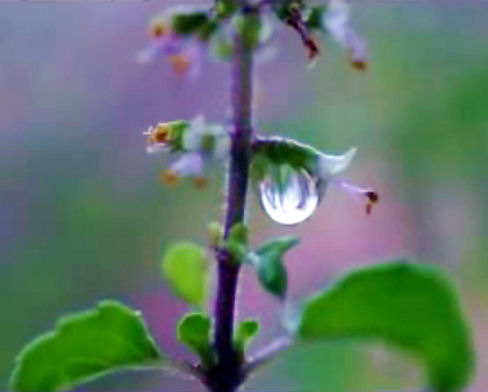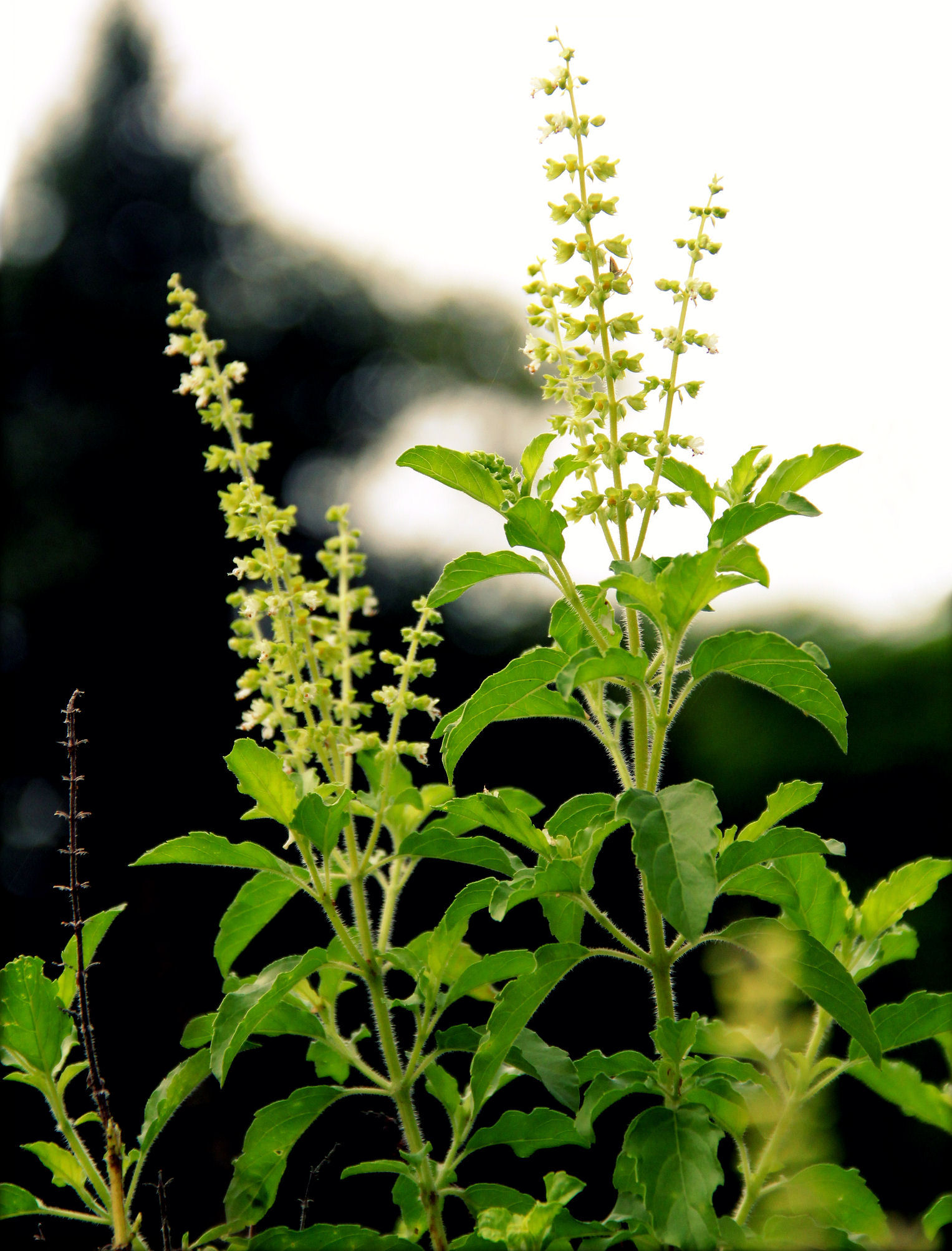|| Śrī Tulasī Aṣṭottara Śatanāmāvalī ||
The 108 names of Śrīmatī Tulasī Devī
Another name of Tulasī is Vṛndā-devī (one who awards residence in Vṛndāvana). Vṛndā-devī is a pure devotee of Lord Kṛṣṇa and an expansion of Śrīmatī Rādhārāṇī. She is responsible for setting up the wonderful pastimes of Śrī Rādhā and Kṛṣṇa in Vṛndāvana. She exists as Tulasī to benefit the fallen conditioned souls by bestowing devotional service to Kṛṣṇa.
॥ श्रीतुलसी अष्टोत्तरशतनामावली ॥
|| śrī tulasī aṣṭottaraśatanāmāvalī ||
The 108 names of Śrīmatī Tulasī Devī
| ॐ श्री तुलस्यै नमः ॥ १॥ ॐ नन्दिन्यै नमः ॥ २॥ ॐ देव्यै नमः ॥ ३॥ ॐ शिखिन्यै नमः ॥ ४॥ ॐ धारिन्यै नमः ॥ ५॥ ॐ धात्र्यै नमः ॥ ६॥ ॐ सावित्र्यै नमः ॥ ७॥ ॐ सत्यसन्धायै नमः ॥ ८॥ ॐ कालहारिण्यै नमः ॥ ९॥ ॐ गौर्यै नमः ॥ १०॥ ॐ देवगीतायै नमः ॥ ११॥ ॐ दवीयस्यै नमः ॥ १२॥ ॐ पद्मिन्यै नमः ॥ १३॥ ॐ सितायै नमः ॥ १४॥ ॐ रुक्मिण्यै नमः ॥ १५॥ ॐ प्रियभुषणायै नमः ॥ १६॥ ॐ श्रेयस्यै नमः ॥ १७॥ ॐ श्रीमत्यै नमः ॥ १८॥ ॐ मान्यायै नमः ॥ १९॥ ॐ गौर्यै नमः ॥ २०॥ ॐ गौतमार्चितायै नमः ॥ २१॥ ॐ त्रेतायै नमः ॥ २२॥ ॐ त्रिपथगायै नमः ॥ २३॥ ॐ त्रिपादायै नमः ॥ २४॥ ॐ त्रैमूर्त्यै नमः ॥ २५॥ ॐ जगत्त्रयायै नमः ॥ २६॥ ॐ त्रासिन्यै नमः ॥ २७॥ ॐ गत्रायै नमः ॥ २८॥ ॐ गत्रियायै नमः ॥ २९॥ ॐ गर्भवारिण्यै नमः ॥ ३०॥ ॐ शोभनायै नमः ॥ ३१॥ ॐ समायै नमः ॥ ३२॥ ॐ द्विरदायै नमः ॥ ३३॥ ॐ आराद्यै नमः ॥ ३४॥ ॐ यज्ञविद्यायै नमः ॥ ३५॥ ॐ महाविद्यायै नमः ॥ ३६॥ ॐ गुह्यविद्यायै नमः ॥ ३७॥ ॐ कामाक्ष्यै नमः ॥ ३८॥ ॐ कुलायै नमः ॥ ३९॥ ॐ श्रीयै नमः ॥ ४०॥ ॐ भूम्यै नमः ॥ ४१॥ ॐ भवित्र्यै नमः ॥ ४२॥ ॐ सावित्र्यै नमः ॥ ४३॥ ॐ सर्व-वेद-विदाम्-वरायै नमः ॥ ४४॥ ॐ शम्खिन्यै नमः ॥ ४५॥ ॐ चक्रिण्यै नमः ॥ ४६॥ ॐ चारिन्यै नमः ॥ ४७॥ ॐ चपलेक्षणायै नमः ॥ ४८॥ ॐ पिताम्बरायै नमः ॥ ४९॥ ॐ प्रीत-सोमायै नमः ॥ ५०॥ ॐ सौरसायै नमः ॥ ५१॥ ॐ अक्षिण्यै नमः ॥ ५२॥ ॐ अम्बायै अमः ॥ ५३॥ ॐ सरस्वत्यै नमः ॥ ५४॥ ॐ सम्श्रयायै नमः ॥ ५५॥ ॐ सर्व-देवत्यै नमः ॥ ५६॥ ॐ विष्वाश्रयायै नमः ॥ ५७॥ ॐ सुगन्धिन्यै नमः ॥ ५८॥ ॐ सुवासनायै नमः ॥ ५९॥ ॐ वरदायै नमः ॥ ६०॥ ॐ सुश्रोण्यै नमः ॥ ६१॥ ॐ चन्द्र-भागायै नमः ॥ ६२॥ ॐ यमुनाप्रियायै नमः ॥ ६३॥ ॐ कावेर्यै नमः ॥ ६४॥ ॐ मणिकर्णिकायै नमः ॥ ६५॥ ॐ अर्चिन्यै नमः ॥ ६६॥ ॐ स्थायिन्यै नमः ॥ ६७॥ ॐ दान-प्रदायै नमः ॥ ६८॥ ॐ धनवत्यै नमः ॥ ६९॥ ॐ शोच्य-मानसायै नमः ॥ ७०॥ ॐ शुचिन्यै नमः ॥ ७१॥ ॐ श्रेयस्यै नमः ॥ ७२॥ ॐ प्रीति-चिन्तेक्षणायै नमः ॥ ७३॥ ॐ विभूत्यै नमः ॥ ७४॥ ॐ आकृत्यै नमः ॥ ७५॥ ॐ आविर्भूत्यै नमः ॥ ७६॥ ॐ प्रभाविन्यै नमः ॥ ७७॥ ॐ गन्धिन्यै नमः ॥ ७८॥ ॐ स्वर्गिन्यै नमः ॥ ७९॥ ॐ गदायै नमः ॥ ८०॥ ॐ वेद्यायै नमः ॥ ८१॥ ॐ प्रभायै नमः ॥ ८२॥ ॐ सारस्यै नमः ॥ ८३॥ ॐ सरसि-वासायै नमः ॥ ८४॥ ॐ सरस्वत्यै नमः ॥ ८५॥ ॐ सारवत्यै नमः ॥ ८६॥ ॐ रसिन्यै नमः ॥ ८७॥ ॐ कालिन्यै नमः ॥ ८८॥ ॐ श्रेयोवत्यै नमः ॥ ८९॥ ॐ यामायै नमः ॥ ९०॥ ॐ ब्रह्म-प्रियायै नमः ॥ ९१॥ ॐ श्यमा-सुन्दरायै नमः ॥ ९२॥ ॐ रत्न-रूपिन्यै नमः ॥ ९३॥ ॐ शम-निधिन्यै नमः ॥ ९४॥ ॐ शतानन्दायै नमः ॥ ९५॥ ॐ शत-द्युतायै नमः ॥ ९६॥ ॐ शिति-कण्थायै नमः ॥ ९७॥ ॐ प्रयायै नमः ॥ ९८॥ ॐ धात्र्यै नमः ॥ ९९॥ ॐ श्री व्र्न्दावन्यै नमः ॥ १००॥ ॐ कृष्णायै नमः ॥ १०१॥ ॐ भक्त-वत्सलायै नमः ॥ १०२॥ ॐ गोपिका-क्रीदायै नमः ॥ १०३॥ ॐ हरायै नमः ॥ १०४॥ ॐ अमृत-रुपिण्यै नमः ॥ १०५॥ ॐ भूम्यै नमः ॥ १०६॥ ॐ श्री क्र्स्ण-कन्तायै नमः ॥ १०७॥ ॐ श्री तुलस्यै नमः ॥ १०८॥ |
1. oṁ śrī tulasyai namaḥ 2. oṁ nandinyai namaḥ 3. oṁ devyai namaḥ 4. oṁ śikhinyai namaḥ 5. oṁ dhārinyai namaḥ 6. oṁ dhātryai namaḥ 7. oṁ sāvitryai namaḥ 8. oṁ satyasandhāyai namaḥ 9. oṁ kālahāriṇyai namaḥ 10. oṁ gauryai namaḥ 11. oṁ devagītāyai namaḥ 12. oṁ davīyasyai namaḥ 13. oṁ padminyai namaḥ 14. oṁ sitāyai namaḥ 15. oṁ rukmiṇyai namaḥ 16. oṁ priyabhuṣaṇāyai namaḥ 17. oṁ śreyasyai namaḥ 18. oṁ śrīmatyai namaḥ 19. oṁ mānyāyai namaḥ 20. oṁ gauryai namaḥ 21. oṁ gautamārcitāyai namaḥ 22. oṁ tretāyai namaḥ 23. oṁ tripathagāyai namaḥ 24. oṁ tripādāyai namaḥ 25. oṁ traimūrtyai namaḥ 26. oṁ jagattrayāyai namaḥ 27. oṁ trāsinyai namaḥ 28. oṁ gatrāyai namaḥ 29. oṁ gatriyāyai namaḥ 30. oṁ garbhavāriṇyai namaḥ 31. oṁ śobhanāyai namaḥ 32. oṁ samāyai namaḥ 33. oṁ dviradāyai namaḥ 34. oṁ ārādyai namaḥ 35. oṁ yajñavidyāyai namaḥ 36. oṁ mahāvidyāyai namaḥ 37. oṁ guhyavidyāyai namaḥ 38. oṁ kāmākṣyai namaḥ 39. oṁ kulāyai namaḥ 40. oṁ śrīyai namaḥ 41. oṁ bhūmyai namaḥ 42. oṁ bhavitryai namaḥ 43. oṁ sāvitryai namaḥ 44. oṁ sarva-veda-vidām-varāyai namaḥ 45. oṁ śamkhinyai namaḥ 46. oṁ cakriṇyai namaḥ 47. oṁ cārinyai namaḥ 48. oṁ capalekṣaṇāyai namaḥ 49. oṁ pitāmbarāyai namaḥ 50. oṁ prīta-somāyai namaḥ 51. oṁ saurasāyai namaḥ 52. oṁ akṣiṇyai namaḥ 53. oṁ ambāyai amaḥ 54. oṁ sarasvatyai namaḥ 55. oṁ samśrayāyai namaḥ 56. oṁ sarva-devatyai namaḥ 57. oṁ viṣvāśrayāyai namaḥ 58. oṁ sugandhinyai namaḥ 59. oṁ suvāsanāyai namaḥ 60. oṁ varadāyai namaḥ 61. oṁ suśroṇyai namaḥ 62. oṁ candra-bhāgāyai namaḥ 63. oṁ yamunāpriyāyai namaḥ 64. oṁ kāveryai namaḥ 65. oṁ maṇikarṇikāyai namaḥ 66. oṁ arcinyai namaḥ 67. oṁ sthāyinyai namaḥ 68. oṁ dāna-pradāyai namaḥ 69. oṁ dhanavatyai namaḥ 70. oṁ śocya-mānasāyai namaḥ 71. oṁ śucinyai namaḥ 72. oṁ śreyasyai namaḥ 73. oṁ prīti-cintekṣaṇāyai namaḥ 74. oṁ vibhūtyai namaḥ 75. oṁ ākṛtyai namaḥ 76. oṁ āvirbhūtyai namaḥ 77. oṁ prabhāvinyai namaḥ 78. oṁ gandhinyai namaḥ 79. oṁ svarginyai namaḥ 80. oṁ gadāyai namaḥ 81. oṁ vedyāyai namaḥ 82. oṁ prabhāyai namaḥ 83. oṁ sārasyai namaḥ 84. oṁ sarasi-vāsāyai namaḥ 85. oṁ sarasvatyai namaḥ 86. oṁ sāravatyai namaḥ 87. oṁ rasinyai namaḥ 88. oṁ kālinyai namaḥ 89. oṁ śreyovatyai namaḥ 90. oṁ yāmāyai namaḥ 91. oṁ brahma-priyāyai namaḥ 92. oṁ śyamā-sundarāyai namaḥ 93. oṁ ratna-rūpinyai namaḥ 94. oṁ śama-nidhinyai namaḥ 95. oṁ śatānandāyai namaḥ 96. oṁ śata-dyutāyai namaḥ 97. oṁ śiti-kaṇthāyai namaḥ 98. oṁ prayāyai namaḥ 99. oṁ dhātryai namaḥ 100. oṁ śrī vrndāvanyai namaḥ 101. oṁ kṛṣṇāyai namaḥ 102. oṁ bhakta-vatsalāyai namaḥ 103. oṁ gopikā-krīdāyai namaḥ 104. oṁ harāyai namaḥ 105. oṁ amṛta-rupiṇyai namaḥ 106. oṁ bhūmyai namaḥ 107. oṁ śrī krsṇa-kantāyai namaḥ 108. oṁ śrī tulasyai namaḥ |
॥ इति श्री तुलसी अष्टोत्तर शतनामावलिः संपुर्णम् ॥
॥ iti śrī tulasī aṣṭottara śatanāmāvaliḥ saṁpurṇam ॥
Thus ends the hymn of 108 names of Śrīmatī Tulasī Devī
Anyone while worshiping Tulasī-devī chants these 108 names will get the same results as one who performs the Ashvamedha sacrifice. And one who on the full-moon day of Kārtika (Tulasī-devī’s appearance day) worships Her by the recitation of these beautiful names, will break free from the bonds of this miserable world of birth and death, and very quickly attains Goloka Vṛndāvan.

तुलस्य् अमृत-जन्मासि सदा त्वं केशव-प्रिया
केशवार्थं चिनोमि त्वां वरदा भव शोभने
tulasy amṛta-janmāsi sadā tvaṁ keśava-priyā
keśavārthaṁ cinomi tvāṁ varadā bhava śobhane
“O Tulasī of effulgent beauty, you were born from nectar, during the churning of the milk ocean. You are always very dear to Lord Keśava. Now, in order to worship Lord Keśava, I am collecting your leaves and mañjarīs. Please bestow your benediction on me that my worship will obtain success.”
The Blessings Tulasī Devī Will Bestow
Chapter Seventeen of “The Story of Śrīmatī Tulasī-devī”
Narrated by Lord Nārāyaṇa
“The sanctifying Tulasī tree will grow in Goloka, on the coast of the Virajā River, on the rasa-dance site, in the forests of Vṛndāvana, Bhāṇḍīra, Champaka, Chandana, and in the groves of Mādhavī, Ketakī, Kunda, Mallika and Mālatī. You will live in sacred places and bestow the highest religious merit. All the holy spots will converge and reside at the root of the Tulasī tree, and thus spiritual merits will accrue to all. O fair one, all the demigods and I will wait there to gather the falling Tulasī leaves.
“Whoever will be moistened or anointed with the water that has been sanctified by Tulasī leaves, will reap the benefits of having bathed in all the sacred rivers and performed all kinds of sacrifices.
• “Lord Hari will not be as pleased with the gift of a thousand jars of honey as with one Tulasī leaf.
• “Offering one such leaf as a gift will bring the same reward obtained by offering millions of cows.
• “If one offers Tulasī leaves during the month of Kārtika, he gets the same rewards as those just mentioned.
• “If, at the time of death, one drinks or gets the Tulasi-leaf water, one will be freed of all his sins and proceed to Vaikuṇṭha.
• “Whoever drinks the Tulasi-leaf water daily will be redeemed in his lifetime and receive the benefit of a dip in the Ganges.
• “Whoever plucks a Tulasī leaf, keeps it on his person, and then leaves his body in a holy place, will go to Viṣṇuloka.
• “Anyone who worships Me with this leaf daily will reap the blessings of a hundred thousand horse sacrifices.
• “Anyone who leaves his body holding a Tulasī leaf in his hands will be saved from all sins.
• “Anyone who wears a necklace composed of Tulasī wood, will surely, at every step, get the reward of a horse sacrifice.
• “Whoever breaks his promise while holding the Tulasī leaf will go to the Kalsutra hell for as long as the sun and moon last.
• “Anyone who gives false evidence in the presence of the Tulasī leaf, will go to the Kumbhīpāka hell for as long as the lifespans of fourteen Indras.
• “Whoever at the time of death drinks or gets a little Tulasi-leaf water will certainly proceed to Vaikuṇṭha, leaving in a jewelled airplane.
“Lord Hari will decapitate that person who, on the day of the new moon or the full moon, or on the twelfth or last day of the lunar month, or after being anointed with oil just before taking a bath, or at noon, night, daybreak or sundown, or in a state of impurity or in one’s night dress–will cull or pluck the Tulasī leaf.
• “O chaste one, even if such a leaf is kept for three nights and becomes dry, it can still be employed in connection with funeral ceremonies, vows, gifts, consecration of temples and the worship of demigods.
• “If Tulasī leaves that were offered to Lord Viṣṇu have fallen on the ground or on water are then properly washed, they may still be used for other sacred purposes.
• “You will always be the presiding deity of the Tulasī plant here on Earth, and at the same time you will always sport with Śrī Kṛṣṇa in solitude in Goloka. You will also be the presiding deity of the Gaṇḍakī River, and thereby shower India with religious merit. You will further be the wife of the ocean of salt, which is My partial expansion. O chaste goddess, you will always remain personally by My side and enjoy My company, as Lakṣmī does.”
Download: tulasi-e-book.pdf










Speak Your Mind